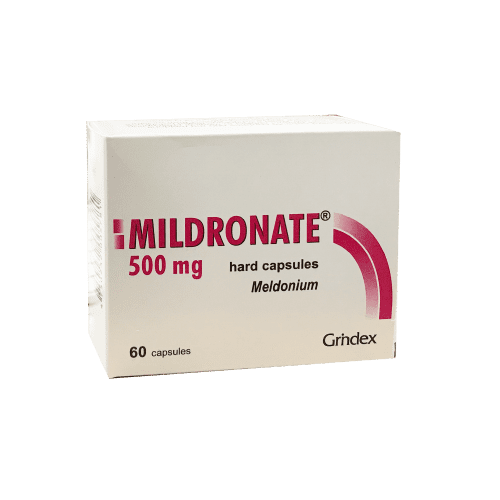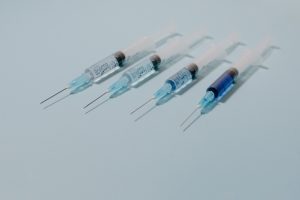
- What Is Meldonium?
- Brief History of Meldonium
- How to Use Meldonium?
- What Should Be Done If an Overdose Occurs?
- To Whom Is It Contraindicated?
- Interactions with Other Medications
- Available Forms
- Famous Meldonium Brands
- Why Do People Use It In Sports?
- Websites and Articles to Delve into the Benefits of Meldonium
- Disclaimer
What Is Meldonium?
Meldonium, also known by its trade name Mildronate, is a medication that gained international attention due to its association with sports doping scandals. Developed in Latvia, meldonium was initially intended to treat various cardiovascular conditions, such as angina and heart failure, by improving blood flow and oxygen delivery to tissues. It belongs to a class of drugs known as “metabolic modulators.”
Meldonium gained notoriety when several high-profile athletes, including tennis player Maria Sharapova, tested positive for the substance. In 2016, the World Anti-Doping Agency (WADA) added meldonium to its list of banned substances, citing concerns about its potential performance-enhancing effects and widespread use in sports.
The drug works by inhibiting a key enzyme involved in the metabolism of fatty acids, which may lead to increased endurance and improved recovery in athletes. However, its use in sports is controversial, and athletes are prohibited from using it in competitions under anti-doping regulations. Outside of sports, meldonium is still prescribed for certain medical conditions, and its effectiveness and safety are subjects of ongoing research and debate.
Brief History of Meldonium
Meldonium, also known by its trade name Mildronate, was developed by the Latvian Institute of Organic Synthesis and introduced to the medical market in the late 1970s. It was created with the aim of treating cardiovascular conditions, particularly angina and heart failure, by improving blood flow and oxygen utilization in the body’s tissues.
Throughout the years, meldonium gained popularity in Eastern Europe and the former Soviet Union as a cardiovascular medication. Its mechanisms involve influencing the metabolism of fatty acids, potentially leading to increased energy production and improved endurance. Athletes in these regions began using meldonium with the belief that it could enhance their physical performance.
The substance attracted global attention in 2016 when several high-profile athletes, including Russian tennis player Maria Sharapova, tested positive for meldonium. In response to concerns about its potential performance-enhancing effects, the World Anti-Doping Agency (WADA) added meldonium to its list of prohibited substances in January 2016. This decision led to sanctions and suspensions for athletes who tested positive for the drug in various sporting events.
The meldonium controversy sparked discussions about doping regulations, the boundary between therapeutic use and performance enhancement, and the responsibilities of athletes and sports organizations. Despite its notoriety in sports, meldonium continues to be used medically in some regions for its intended cardiovascular purposes.
| Year | Event |
|---|---|
| Late 1970s | Meldonium (Mildronate) developed for cardiovascular conditions. |
| 2016 | Several athletes, including Maria Sharapova, test positive for meldonium, leading to a ban by the World Anti-Doping Agency (WADA). |
| Present | Meldonium remains a controversial substance, prohibited in sports but still used medically for cardiovascular purposes in certain regions. |
How to Use Meldonium?
Meldonium, also known by its trade name Mildronate, is a prescription medication used for certain cardiovascular conditions. It should only be used under the supervision and guidance of a healthcare professional. The dosage and duration of treatment will be determined by the prescribing doctor based on individual health considerations. Here are general guidelines for using meldonium:
- Prescription Only:
- Meldonium is available only by prescription. Do not self-prescribe or use meldonium without consulting a healthcare provider.
- Dosage:
- Follow the dosage instructions provided by your doctor. The typical dose may vary based on the specific cardiovascular condition being treated.
- Administration:
- Meldonium is usually taken orally, with or without food. It is commonly available in the form of capsules or tablets.
- Compliance:
- Take meldonium regularly and at the same time each day as prescribed by your doctor. Do not skip doses or stop taking it without consulting your healthcare provider.
- Monitoring:
- Your healthcare provider may monitor your progress and adjust the dosage as needed. Follow-up appointments and regular check-ups are essential.
- Interaction with Other Medications:
- Inform your doctor about all the medications, supplements, or herbal products you are taking, as meldonium may interact with certain drugs.
- Special Precautions:
- Discuss any pre-existing medical conditions, allergies, or concerns with your healthcare provider before starting meldonium.
- Athletes and Doping Regulations:
- Athletes should be aware that meldonium is on the World Anti-Doping Agency’s (WADA) list of prohibited substances. It is essential to comply with anti-doping regulations in sports.
- Side Effects:
- Be aware of potential side effects and promptly report any unusual symptoms or reactions to your healthcare provider.
- Discontinuation:
- Do not stop taking meldonium abruptly without consulting your doctor, as sudden discontinuation may have adverse effects.
It is crucial to emphasize that meldonium should only be used for its intended medical purposes and under the supervision of a qualified healthcare professional. If you have questions or concerns about the use of meldonium, consult with your doctor for personalized advice based on your health condition and medical history.
What Should Be Done If an Overdose Occurs?
If an overdose of meldonium (Mildronate) is suspected, it is essential to seek immediate medical attention. Overdosing on any medication can have serious consequences, and prompt medical intervention is crucial. Here are general guidelines on what should be done in the case of a suspected meldonium overdose:
- Call Emergency Services:
- Dial emergency services or the local poison control center immediately. In the United States, the national poison control hotline is 1-800-222-1222.
- Provide Information:
- Be prepared to provide information about the individual, including their age, weight, and any symptoms they may be experiencing.
- Do Not Wait:
- Do not wait for symptoms to worsen. Seek medical help as soon as an overdose is suspected.
- Avoid Self-Treatment:
- Do not attempt to treat the overdose at home with home remedies or by inducing vomiting unless specifically advised by healthcare professionals.
- Bring Medication Packaging:
- If possible, bring the medication packaging or any remaining pills to the hospital to assist healthcare providers in determining the extent of the overdose.
- Monitor Vital Signs:
- Keep the affected person calm and monitor their vital signs, such as breathing and heart rate, while waiting for medical assistance.
- Follow Medical Advice:
- Follow the instructions provided by healthcare professionals upon arrival at the hospital. Treatment for a medication overdose may involve various interventions, including supportive care, activated charcoal, or other measures based on the severity of the overdose.
It is crucial to note that the information provided here is general guidance, and specific actions may vary based on the individual circumstances of the overdose. Immediate medical attention is the most important step in addressing a suspected overdose.
Additionally, this information is not a substitute for professional medical advice. If you suspect an overdose or have concerns about medication, contact a healthcare professional or local emergency services promptly.
To Whom Is It Contraindicated?
Meldonium (Mildronate) is contraindicated in certain individuals due to potential risks and interactions with existing health conditions. Contraindications refer to situations where the use of a particular medication is not advisable or should be avoided. It is essential to consult with a healthcare professional before using meldonium, and individuals falling into the following categories should be cautious or avoid its use:
- Allergic Reactions:
- Individuals with known allergies or hypersensitivity to meldonium or its components should not use the medication.
- Pregnant and Breastfeeding Women:
- The safety of meldonium during pregnancy and breastfeeding has not been well-studied. Pregnant women or those breastfeeding should consult with a healthcare provider before using meldonium.
- Severe Liver or Kidney Dysfunction:
- Meldonium is primarily excreted through the kidneys. Individuals with severe liver or kidney dysfunction may need dose adjustments or should avoid meldonium due to the potential risk of accumulation.
- Hypotension (Low Blood Pressure):
- Meldonium can affect blood pressure. Individuals with hypotension should use meldonium cautiously, and its use may be contraindicated in severe cases.
- Cardiovascular Disorders:
- Patients with severe cardiovascular disorders, including acute myocardial infarction, unstable angina, and other serious heart conditions, may be at increased risk and should use meldonium with caution.
- Cerebrovascular Disorders:
- Meldonium may influence blood flow and oxygen delivery to tissues. Individuals with a history of cerebrovascular disorders should use meldonium cautiously.
- Individuals Under 18 Years of Age:
- Limited data is available on the safety and efficacy of meldonium in individuals under 18 years old. Its use in this age group is generally not recommended.
- Athletes Subject to Anti-Doping Regulations:
- Athletes subject to anti-doping regulations, including those governed by the World Anti-Doping Agency (WADA), should be aware that meldonium is a prohibited substance.
- Interactions with Other Medications:
- Meldonium may interact with certain medications. Individuals taking other prescription or over-the-counter medications should inform their healthcare provider to assess potential interactions.
It is crucial to provide a comprehensive medical history to the healthcare professional before starting any new medication, including meldonium. This allows for a thorough evaluation of potential risks and benefits based on individual health conditions. Always follow the guidance of a qualified healthcare provider regarding the use of meldonium or any other prescription medication.
Interactions with Other Medications
Meldonium may interact with certain medications, and it is important to inform your healthcare provider about all the medications you are taking, including prescription, over-the-counter, and herbal supplements. Here are some potential interactions to be aware of:
- Anticoagulants (Blood Thinners):
- Meldonium may enhance the effects of anticoagulants, increasing the risk of bleeding. Close monitoring and possible dose adjustments may be necessary.
- Antiplatelet Drugs:
- Combining meldonium with antiplatelet medications, such as aspirin or clopidogrel, may increase the risk of bleeding. Caution and monitoring are advised.
- Antihypertensive Medications:
- Meldonium may have hypotensive effects, potentially enhancing the blood pressure-lowering effects of antihypertensive medications. Monitoring blood pressure and adjusting doses may be necessary.
- Vasodilators:
- Meldonium has vasodilatory effects, and combining it with other vasodilators may lead to additive effects. Caution is advised, especially in individuals with low blood pressure.
- Nitroglycerin and Nitrates:
- Meldonium’s vasodilatory effects may interact with nitroglycerin and other nitrates, potentially leading to hypotension. Close monitoring is recommended.
- Diuretics (Water Pills):
- Meldonium’s effects on electrolyte balance may interact with diuretics, potentially affecting potassium levels. Monitoring electrolytes is important when using these medications together.
- Lithium:
- Meldonium may increase the excretion of lithium, potentially reducing its effectiveness. Monitoring lithium levels and adjusting doses may be necessary.
- Corticosteroids:
- Meldonium may enhance the immunosuppressive effects of corticosteroids. Caution is advised, especially in individuals taking corticosteroids for prolonged periods.
- Cyclosporine:
- Meldonium may increase the blood levels of cyclosporine, a medication used to suppress the immune system. Close monitoring and potential dose adjustments are needed.
- Other Cardiovascular Medications:
- Meldonium’s cardiovascular effects may interact with other medications used to treat heart conditions. Monitoring and adjustments may be necessary.
These potential interactions highlight the importance of open communication with your healthcare provider. Your doctor will consider your complete medical history and the medications you are taking to determine the appropriateness of meldonium and whether any adjustments or precautions are needed. Never start, stop, or change the dosage of any medication without consulting your healthcare professional.
Available Forms
Meldonium, commonly known by its trade name Mildronate, is available in various pharmaceutical forms for medicinal use. The specific formulations may vary by region, and availability depends on local regulations and pharmaceutical companies. The primary forms in which meldonium is typically available include:
- Oral Capsules:
- Meldonium is commonly manufactured and prescribed in the form of oral capsules. These capsules contain a measured dose of the active ingredient and are designed for oral administration.
- Oral Tablets:
- Tablets are another oral form of meldonium. Like capsules, tablets provide a convenient way to administer a specific dosage of the medication.
- Injection Solution:
- In some medical settings, particularly in hospitals or clinical environments, meldonium may be available in the form of an injectable solution. This form is typically used when intravenous administration is necessary.
- Oral Solution:
- Meldonium oral solution is a liquid form of the medication. This may be used in situations where patients have difficulty swallowing capsules or tablets.
- Topical Preparations (Limited):
- There have been limited reports of topical formulations of meldonium, such as creams or ointments. However, these forms may not be as common as oral formulations.
It’s important to note that the availability of specific forms may vary across different countries and regions. The choice of formulation is often based on factors such as the patient’s condition, the severity of the medical issue, and the route of administration that is most suitable.
Regardless of the form, meldonium is a prescription medication, and its use should be guided by a qualified healthcare professional. Patients should follow the prescribed dosage and administration instructions provided by their healthcare provider. Additionally, patients should inform their healthcare team about any allergies, existing medical conditions, or other medications they are taking to avoid potential interactions or adverse effects.
Famous Meldonium Brands

Meldonium is a pharmaceutical substance known by various brand names, and its availability can vary by region. The most well-known brand name for meldonium is “Mildronate.” Here are some of the famous brands of meldonium:
- Mildronate:
- Mildronate is the original and widely recognized brand name for meldonium. It is manufactured by the Latvian pharmaceutical company Grindeks.
- Meldonium-MIK:
- Meldonium-MIK is another brand associated with meldonium, and it may be produced by different pharmaceutical manufacturers.
It’s important to note that the availability of specific brands may depend on the country or region. Additionally, due to the controversies surrounding the use of meldonium in sports and its subsequent inclusion in the list of prohibited substances by anti-doping agencies, the use of meldonium has become a subject of scrutiny and discussion.
Athletes should be aware that using meldonium, even under its brand names, might be subject to anti-doping regulations in sports. It is crucial for individuals to adhere to the rules and guidelines set forth by relevant sports organizations and anti-doping agencies.
As with any prescription medication, individuals should only use meldonium under the guidance and supervision of a qualified healthcare professional. They should inform their healthcare provider about any existing medical conditions, allergies, or other medications they are taking to ensure safe and effective use.
Why Do People Use It In Sports?
The use of meldonium (Mildronate) in sports has been associated with several potential benefits, leading some athletes to use it. However, it’s important to note that the World Anti-Doping Agency (WADA) added meldonium to its list of prohibited substances in 2016, and its use in competitive sports is strictly regulated. Athletes found to have meldonium in their system during anti-doping testing may face sanctions and penalties. Despite this, here are some reasons why individuals, particularly athletes, have considered using meldonium:
- Enhanced Exercise Capacity:
- Meldonium has been suggested to improve exercise capacity by increasing oxygen delivery to tissues. This could potentially lead to enhanced endurance and stamina during physical activities.
- Improved Recovery:
- Some athletes may believe that meldonium could aid in faster recovery after intense training or competition, reducing fatigue and muscle soreness.
- Cardioprotective Effects:
- Meldonium was initially developed for its potential cardioprotective effects, improving blood flow and oxygen utilization. Athletes might believe that these cardiovascular benefits could positively impact their performance.
- Mitochondrial Function:
- Meldonium is thought to have an impact on mitochondrial function, potentially influencing energy production within cells. This could contribute to improved physical performance.
- Neuroprotective Effects:
- Some studies suggest that meldonium may have neuroprotective properties. Athletes might be interested in potential cognitive benefits, although the evidence in this regard is not fully established.
It’s essential to emphasize that while these potential benefits have been suggested in studies, the use of meldonium in sports is controversial, and its efficacy and safety for performance enhancement are not universally accepted. Moreover, the inclusion of meldonium on the WADA list of prohibited substances underscores the importance of maintaining fair competition and ensuring that athletes do not gain an unfair advantage through the use of substances that may pose risks or have unclear benefits.
Athletes should adhere to anti-doping regulations and rely on legal and ethical means to enhance their performance, such as proper training, nutrition, and recovery strategies. Using substances like meldonium can lead to serious consequences, including bans from competition and damage to an athlete’s reputation.
Websites and Articles to Delve into the Benefits of Meldonium
These websites offer a variety of perspectives and information on meldonium, including its pharmacology, uses, controversies, and the implications of its inclusion on the list of prohibited substances in sports. Readers interested in exploring the topic further can refer to these sources for a more in-depth understanding:
- Medical News Today – Meldonium: Uses, Benefits, and Risks
- Wikipedia – Meldonium
- Vox – Meldonium: The drug that got Maria Sharapova banned
- Clinical Pharmacology & Drug Development – Meldonium (Mildronate) pharmacokinetics and pharmacodynamics
- ScienceDirect – Meldonium
- SAGE Journals – Meldonium: Update on pharmacology, clinical use, and doping control analysis
- The Guardian – Meldonium: What is the banned drug that Maria Sharapova was taking?
- Encyclopedia Britannica – Meldonium
- University of Utah Health – What is Meldonium?
- Outside Online – What is Meldonium (Mildronate)?
- CBS News – What is meldonium, the banned drug tennis star Maria Sharapova was taking?
These sources provide a mix of scientific information, news reports, and discussions surrounding meldonium. Remember to critically evaluate information and consider multiple perspectives when researching complex topics like this one.
Disclaimer
The information is solely provided for educational purposes. It is not intended to diagnose, treat, cure, or prevent any disease. Seek the advice of your physician or qualified healthcare provider with any questions you may have regarding a medical condition at all times. Never disregard professional medical advice because of something you have read or learned from this article.






